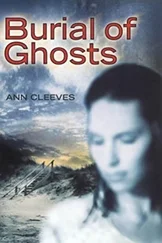Again Polly was thrown. How could this stranger know what she did for a living? Were Shetlanders all mind-readers? She had the sudden thought that she must be imagining the whole scene and that she’d dreamed the stay on Unst, from the moment of their arrival in the islands. Nothing here was real. Soon she’d wake up to find that Eleanor was still alive.
‘I visited once,’ the woman went on. ‘It was quite fascinating. It must be a wonderful place to work.’ Then she must have noticed Polly’s confusion because she introduced herself as a historian from the museum in Lerwick. ‘Simon, the archivist, said you’d been in to see us. I can see why you were interested in Peerie Lizzie. One domestic tragedy and a whole mythology grows up around it. We all have to find ways to explain the things that make us sad. Chance is never quite enough, is it?’
Polly wasn’t sure how to answer, so she just smiled. But she thought the idea was interesting. Would Eleanor become part of the Peerie Lizzie myth; would the story mutate and develop to include a strange, dark woman from the south? A pretty teenage boy came to clear her plate. At the other end of the room three children had started to dance to the fiddle music. The historian turned away to continue a conversation with an elderly man on the other side of the table. It seemed that Polly wasn’t expected to reply. She sat back in her chair and glanced outside. The fog was dense and grey and blanked out the light. The candles in the room glowed in the shadow. She looked again at the children dancing. Some of the adults had started to clap to the rhythm, cheering them on. The music got faster and the dancing more wild. The audience banged on the table to the beat. There were two boys and a girl. The boys had grey shirts and identical hand-knitted Fair Isle waistcoats. The girl was dressed in white and had black pumps on her feet. With a start, Polly realized that she was familiar. It was the child from the beach. Eleanor’s ghost-child.
Sandy was in the office at Springfield House. He’d been working on the boring stuff, sitting at the computer in the hotel office checking the history of the people involved on the periphery of the case. Now he’d taken a break, made himself coffee and was thinking again about Elizabeth Geldard. He didn’t understand how the death of a bairn so long ago could trigger a series of murders in the present, but Jimmy Perez was a great one for history, for digging into the past, and Sandy always wanted to impress him. At the same time, at the back of his mind he was thinking about Louisa. Of course he fancied her to bits, but he’d never been so choosy and he’d fancied lots of lasses, had been out with a few of them. This time it was different, though. He admired Louisa too. The job in the school, and caring for her mother and dealing with the complication of her family life with such dignity and good humour. Once this was over he’d find a way of taking her out. It must be possible to find someone to care for the old lady for an evening. He wondered where Louisa might like to go. It would be splendid to give her a treat.
David Gordon hadn’t appeared downstairs since he’d taken a sandwich to his room. Sandy had the office door open so that he’d hear him if he was moving around, but the whole place felt quiet. Dead. He turned back to the screen. Five minutes later he was on the phone to Mary Lomax. ‘Any chance you could come here for an hour? I need to pop out, but Jimmy and Willow are in Yell and I don’t want to leave Mr Gordon on his own.’
‘Are you expecting him to do a runner?’ It sounded as if she was eating.
‘Nothing like that. I just don’t think I should leave him.’
She arrived twenty minutes later carrying a woven bag, with fine yarn and knitting needles sticking out of the top. He left her in the kitchen watching a period drama on the small television set there, the shawl she was working on spread over her lap.
In Voxter he found Grusche and George sitting in front of the same programme. There was no sign of Caroline or Lowrie, and Sandy was pleased about that. Having them there would have made things more complicated. The programme was coming to an end and he waited with them until it was finished; the grand house and the lord and lady with their servants reminded him of how Springfield House must once have been.
‘How are you, Sandy?’ George got slowly to his feet and rubbed his back. This time of year he’d be singling neeps on the croft and he’d be stiff and sore. ‘Will you take a dram?’
Sandy shook his head.
‘Tea then?’
‘Fine, that.’
Grusche got up too and moved the kettle on the range. ‘Look at that fog coming in from the sea. What a dreadful summer it’s been for fog! Lowrie and Caroline are supposed to be flying south tomorrow, but I’m not sure the planes will go.’
‘Where are they now?’ Sandy was wishing that Grusche would leave the room. He would feel more comfortable talking just to George.
‘Out with their friends from Sletts. It’s their last night. They’ve walked along the path to the boat club. There’s some sort of do going on there.’ She sounded disapproving. Perhaps she thought it was disrespectful for the younger folk to be out when two people had died. ‘I’ll leave you to make the tea, George. There’s some shortbread left in the tin. I have my spinning wheel set up in the other room and I’d like to get that fleece spun.’ She walked away.
They both drank tea and sat across the table from each other.
‘I’d been wondering about Elizabeth Geldard,’ Sandy said.
George looked up at him, but said nothing.
‘In those days it wouldn’t have been so likely for a couple to have a baby when they were in their forties.’
‘Not unheard of,’ George said.
‘I wondered if maybe they’d adopted her.’ The idea had been rattling around in his head since he’d been talking to Louisa.
George said nothing.
‘It was a long time ago.’ Sandy drank tea and reached into the blue biscuit tin for some shortbread. ‘We look at things differently now. No shame to having a child born out of wedlock.’
‘It depends who the father was.’
There was a moment of silence. ‘But the mother was Sarah? Your great-aunt and nursemaid at the big house?’
Another silence. ‘That’s the story in the family.’
Sandy thought that would make perfect sense. Sarah would have been hardly more than a child when she got pregnant. Fifteen at the most. Probably ignorant about sex, and taken advantage of. And the couple in the big house were desperate for a child, so it would seem the perfect solution to pass the baby off as their own. The Geldards would spend a lot of their time in the south anyway, so nobody would be surprised if they arrived in Unst with a new baby. No doubt Sarah would have been spirited away to relatives in a different part of Shetland, once the pregnancy started showing. And when she returned the Geldards employed her to take care of her own child. Who better to look after the little girl? And it would explain why she was so upset when Lizzie died, why she felt she had to run away from the islands. And why she’d named her second daughter Elizabeth.
‘Who was the father?’ Sandy wasn’t sure if any of this was important to the present case, but now he’d started he wanted the full story.
George was looking out of the window. ‘There’s no proof.’ He gave an awkward laugh. ‘No paternity tests in those days.’
‘But there would have been rumours. The girl would have known.’
Another silence. George seemed to be weighing up how much to say. ‘The story is that it was Gilbert Geldard himself. His taste was more for young things than for his middle-aged wife. Maybe that was why she never conceived a child.’
Читать дальше












